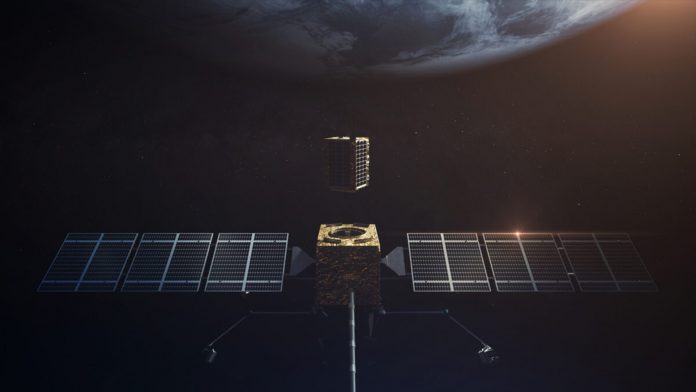The U.S. Space Force and Astroscale have signed a deal worth $25.5m to co-invest in an on-orbit refuelling vehicle capable of refuelling satellites in orbit.
Astroscale, which will provide $12m towards the project, will have a ‘manifest ready’ prototype refuelling vehicle ready within two years.
After significant interest in the project, Astroscale won a so-called Other Transaction Authority, or OTA, contract. OTAs give the government flexibility to negotiate with contractors and share the cost of projects.
The $25.5m contract awarded to Astroscale was funded by a $30m congressional earmark added to the Space Force’s 2023 budget.
Taking advantage of unique innovations in space tech
Astroscale’s bid for the refuelling vehicle was one of 23 received through the Space Enterprise Consortium (SePC), which was created to attract startups and commercial companies to compete for space tech programmes.
The satellite refuelling vehicle will be known as APS-R, for Astroscale Prototype Servicer for Refuelling. It will use a refuelling port made by Orbit Fab called RAFTI – short for rapidly attachable fluid transfer interface.
The RAFTI port is one of the commercial interfaces that are entering the market for in-space refuelling. Astroscale plans to use Orbit Fab refuelling services for its commercial missions.
The Space Force prototype vehicle will be based on an Astroscale commercial design.
Colonel Joyce Bulson, project manager at Space Systems Command, explained: “We are trying to pass on as few military-unique requirements to the space industry as possible, and want them to demonstrate what is possible.”
Demonstrating the refuelling vehicle in orbit
It has yet to be determined if or when the refuelling vehicle will launch into orbit for an in-space demonstration.
However, if this does happen, a potential client satellite could be one of the Tetra-5 small satellites projected to launch in 2025 for an on-orbit refuelling experiment funded by the Space Force and the Defense Innovation Unit.
The Space Force has not yet settled on a particular standard for the refuelling vehicle, as the space industry is still deciding what is suitable.
“We’d like to keep options open as long as possible so we have competition,” Bulson said.
“We feel it’s early enough in the market to go ahead and try to prove concepts out.”
Although space logistics projects are now being funded by congressional add-ons, the Space Force plans to advocate for long-term funding starting in the 2026 budget cycle.
Bulson concluded: “We’re living basically year to year with congressional plus ups. The hope is that we have a compelling case that we put into the fiscal year 2026 programme that makes sense to all of our stakeholders.”









